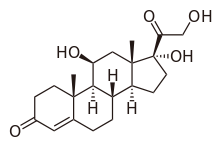Cortisol
steroid hormone, in the glucocorticoid class of hormones; when used as a medication, it is known as hydrocortisone
This article relies largely or entirely on a single source. |
Cortisol also called the stress hormone, is produced in the adrenal gland. It is a cortiocosteroid, often known as a steroid hormone.[1]

The purpose of cortisol is to help the body:
- metabolize glucose
- control blood pressure
- suppress immunity
- an inflammatory response
Corticosteroids can also be used to replace certain hormones to treat illnesses. Addison’s disease is one.
Actions
changeCorticosteroids
changeA Synthetic hormone normally produced by the adrenal glands. They’re used to treat conditions like:[1]
- asthma
- allergic rhinitis and hayfever
- atopic eczema
- urticaria (hives)
- chronic obstructive pulmonary disease (COPD)
- painful and inflamed joints, muscles and tendons
- lupus
- inflammatory bowel disease (IBD) – including Crohn’s disease and ulcerative colitis
- giant cell arteritis and polymyalgia rheumatica
- multiple sclerosis (MS)
Related pages
changeReferences
change- ↑ 1.0 1.1 nhs.scot. June 2023 https://web.archive.org/web/20240404205548/https://www.nhsinform.scot/tests-and-treatments/medicines-and-medical-aids/types-of-medicine/corticosteroids/. Archived from the original on 2024-04-04. Retrieved 2024-05-29.
{{cite web}}: Missing or empty|title=(help)
Other websites
change- Cortisol Archived 2012-11-01 at the Wayback Machine